Licences rescinded in new threat to media freedom in Burundi

The decision by Burundi’s National Council for Communication (CNC) to strip four broadcast media outlets of their licences and to suspend a radio station for three months will have disastrous consequences for the country’s already fragile media pluralism and for the safety of its journalists, Reporters Without Borders (RSF) says.
Announcing the decision on 28 September, CNC vice-president and spokesperson Aimée-Divine Niyokwizigirwa said Radio Publique Africaine, Radio Bonesha, Radio Renaissance and Télévision Renaissance were having their licences rescinded for spending more than three months without broadcasting and for “failing to sort out their judicial status in time.”
The withdrawal of the licences of four broadcast media outlets that were no longer broadcasting is more than an administrative formality because their journalists were continuing to cover the news in Burundi on the websites and YouTube TV channels that these outlets are now running.
Niyokwizigirwa told RSF that that the licence revocation applied to all aspects of the activities of these media outlets, meaning that their websites are also now banned. This could have grave consequences for their reporters in Burundi, both for their safety and their ability to keep working.
They were already constantly harassed by the authorities, who accused them of working for illegal media. Now the authorities have grounds for claiming that they are illegal.
“By rescinding the licences of these media, the CNC is excluding any possibility of their resuming broadcasting in the future, although they have for years acted as the voice of all those who could not obtain any answers to their problems from the authorities,” said RSF’s Africa desk.
“The CNC is helping the government to pursue its planned suppression of media pluralism in Burundi. Even if they deny it, the Burundian authorities do not tolerate any comments on the country’s security situation.”
The regime’s hostility towards these four media outlets no longer needs to be demonstrated. The grounds given for withdrawing their licences do not lack irony given that all four were the victims of arson or heavy-weapon attacks that forced them to stop broadcasting during the failed military coup against President Nkurunziza in May 2015.
Thereafter, they remained closed on the orders of the authorities, on the official grounds that the attacks against them were the subject of a judicial investigation, although its findings were never released. The CNC’s vice-president was also unable to provide any information about the state of the investigation.
International warrants were subsequently issued for the directors of these media outlets because they were accused of abetting the coup attempt by broadcasting information about it while it was under way.
No criticism tolerated
As well as completely neutralizing media outlets that have traditionally been independent, the CNC is also now cracking down on the least sign of criticism from media that have usually been more docile.
The CNC announced that it was suspending the radio station of the Chamber of Commerce and Industry of Burundi, CCIB FM+, for three months for violating “professional ethics and the media law” in a 18 September editorial.
The editorial criticized the lack of any government reaction to the massacre of 36 Burundian refugees in Kamanyola, in the neighbouring Democratic Republic of Congo, on 15 September. It also mentioned the lack of adequate investigations into the bodies that regularly appear on the streets of Bujumbura and other parts of the country.
The CNC said the editorial also violated the terms of CCIB FM+’s licence, under which it is supposed to “focus above all on covering and promoting the private sector.” This was also the grounds given by the radio station when it announced that it was firing its manager, Eddy-Claude Nininahazwe, in an attempt to ingratiate itself with the CNC, although he had in fact resigned the day before he was fired.
Nininahazwe said he stood by what he said in the editorial, citing the station’s right to editorial independence. He also pointed out that the widespread violence was contributing to an unfavourable business climate.
He is not the only person to criticize the violence against civilians. A report issued by the UN Commission of Inquiry on Burundi on 4 September urged the International Criminal Court to open an investigation into what it called a “general or systematic attack against the civilian population.”
Government spokesman Willy Nyamitwe described the report as part of a western plot to destabilize Burundi, where UN experts have not been welcome since October 2016.
Burundi is ranked 160th out of 180 countries in RSF’s 2017 World Press Freedom Index, after falling 15 places in the past two years.


